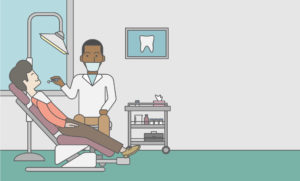 Nobody wants to experience oral cancer at any stage in their life. Unfortunately, the American Cancer Society (ACS) states that about 48,330 people will be diagnosed with oral or pharyngeal cancer this year. Moreover, around 9,570 people are estimated to die from the disease, and 66% of Americans will discover they have oral cancer in its late stages.
Nobody wants to experience oral cancer at any stage in their life. Unfortunately, the American Cancer Society (ACS) states that about 48,330 people will be diagnosed with oral or pharyngeal cancer this year. Moreover, around 9,570 people are estimated to die from the disease, and 66% of Americans will discover they have oral cancer in its late stages.
If patients want to increase their chances of surviving, then early diagnosis—or better yet, prevention—is extremely important. But what are the signs of oral cancer, and how can you keep it from you and your family? Dr. Tim Kosinski has solid answers, including some great foods for cancer prevention.
First, let’s review some oral cancer basics.
The Symptoms Of Oral Cancer
You can often find oral cancer on the lips, tongue, or under the tongue, but it can also be spotted elsewhere in the mouth. You should know that this disease isn’t always visible in its early stages, which is why we recommend our comprehensive oral cancer screenings to all our Bingham Farms patients. However, there are some signs to look out for.
Here are some common symptoms of oral cancer:
- A persistent sore or strange growth in the mouth
- Red or white colored lesions
- Loose teeth or sudden bleeding in the mouth
- A numbness or mouth pain that doesn’t go away
- A feeling of something caught in the back of the throat
- Ear pain without hearing loss
If you’re currently experiencing any of these symptoms, you should let a dentist like Dr. Kosinski know right away. Again, early diagnosis is very important for effectively treating oral cancer.
However, maybe you’re not manifesting any of these symptoms. How can you make sure that you never do?
5 Tips To Avoid The Dangers Of Oral Cancer
Here at SmileCreator, we’re happy to help our patients with existing issues, but we also believe in preventative health. Following the advice below can increase your chances of never contracting oral cancer.
1. Avoid Excessive Alcohol Consumption
The Oral Health Foundation (UK) reports that 1 in 3 oral cancer cases is linked to excessive alcohol consumption. If you don’t want oral cancer to be a part of your story, the American Cancer Society recommends no more than 2 drinks a day for men and 1 drink a day for women. Let moderation be your watchword in 2017, and prepare to see better oral health!
2. Steer Clear Of Tobacco Use
 According to the Mouth Cancer Foundation, 90% of oral cancer patients are tobacco users. Moreover, people who use tobacco and drink often are at an even higher risk for mouth cancer. For decades, doctors have connected tobacco use of all kinds with other kinds of diseases as well, including lung, throat and stomach cancer, type 2 diabetes, and COPD (chronic obstructive pulmonary disease).
According to the Mouth Cancer Foundation, 90% of oral cancer patients are tobacco users. Moreover, people who use tobacco and drink often are at an even higher risk for mouth cancer. For decades, doctors have connected tobacco use of all kinds with other kinds of diseases as well, including lung, throat and stomach cancer, type 2 diabetes, and COPD (chronic obstructive pulmonary disease).
If you still have smoking habits, we urge you to consider its effects on your oral health as well as those around you.
3. Develop And Maintain Good Oral Care Habits
A person’s risk for oral cancer goes up 2.5 times if they have periodontal disease, and 60 times higher if they have 6 or more missing teeth. Because of this, we recommend using and maintaining great brushing and flossing habits. Consider the following tips:
- Brush your teeth twice a day for two minutes or more
- Brush your tongue every time you brush your teeth
- Floss daily, gently and close to your teeth to avoid gum damage
- Drink plenty of water every day
- Use softer toothbrushes to prevent enamel loss and gum erosion
Remember: brushing and flossing daily are only the first parts of the equation. How you brush and floss is just as important as well. If you develop the above habits and don’t rush through your oral care times, you’ll be in good shape to keep oral cancer at bay.
4. See A Good Dentist Twice A Year For Checkups
 Reports from the National Institute of Dental Craniofacial Research state that if oral cancer is found early enough, the odds of successful treatment are high. This is why regular dental appointments are so important.
Reports from the National Institute of Dental Craniofacial Research state that if oral cancer is found early enough, the odds of successful treatment are high. This is why regular dental appointments are so important.
Oral cancer can actually be difficult to self-diagnose in its early stages, but experienced dentists know the signs of this disease. This includes oral abnormalities that may seem normal to most.
Don’t rely solely on your own oral care habits. Visit a dentist like Dr. Kosinski at least twice a year to secure your oral health.
5. Eat Healthy, Cancer-Fighting Foods
One study shows the right kind of diet that can keep oral cancer from materializing: “Current evidence supports a recommendation of a diet rich in fresh fruits and vegetables as part of a whole-foods, plant-based diet with limit consumption of meat, particularly processed meat.” These findings are why we’re supplying you with a list of great foods that can prevent oral cancer.
Changing a regular diet may be inconvenient for some, but it’s one of the best ways to promote overall as well as oral health. After all, the Oral Health Foundation states that “up to half of all mouth cancer cases are partly due to poor diet.”
Try incorporating the below foods into your regular meals, and watch how you’ll feel and look better while fighting oral cancer.
Berries Of All Kinds
 Blueberries, raspberries, blackberries, strawberries, and more have long been commended for their overall health benefits. Besides antioxidants and other vitamin-rich properties, research also shows that berries pack an oral cancer-fighting component called ellagic acid. This phytonutrient helps slow cancer cell growth and helps keep the liver healthy as well.
Blueberries, raspberries, blackberries, strawberries, and more have long been commended for their overall health benefits. Besides antioxidants and other vitamin-rich properties, research also shows that berries pack an oral cancer-fighting component called ellagic acid. This phytonutrient helps slow cancer cell growth and helps keep the liver healthy as well.
Pro tip: If you don’t like eating berries on their own, try placing them in another breakfast or snack food like oatmeal or yogurt for a tasty, nutrient-rich combination.
Fish
Dr. Tieraona Low Dog, an expert on integrative medicine and a National Cancer Institute panelist, has championed the disease-preventing benefits of foods rich in omega-3 fatty acids and vitamin D—including fish like salmon and tuna. According to Dr. Low Dog, including fish in your diet can prevent cancer and periodontal disease, which keeps you out of oral cancer’s reach in a big way. As the value of a fish-friendly diet has been promoted by other health experts, our patients will benefit if they follow this advice.
Pro tip: Many people love fish sticks, fish and chips, and other kinds of fried seafood. However, try steamed, broiled, or grilled fish for healthier alternatives that still taste great.
Broccoli, Cauliflower, And Cabbage
These foods in the cabbage family are also called “cruciferous vegetables,” and all of them are excellent choices for preventing oral cancer. The American Institute for Cancer Research reports that these vegetables slow cancer cell growth and keep cancers from ever forming. As you might expect, other vegetables are important for a cancer-fighting diet as well.
Pro tip: Cruciferous vegetables go well with many dishes and cuisines. Try them in stews, casseroles, or as steamed sides to main dishes like chicken or fish.
Citrus Fruits
 Studies show that people who take vitamin C supplements have a 24% lower risk of oral cancer. While supplements are good, however, you can’t beat getting vitamin C naturally from fruits like oranges and grapefruits.
Studies show that people who take vitamin C supplements have a 24% lower risk of oral cancer. While supplements are good, however, you can’t beat getting vitamin C naturally from fruits like oranges and grapefruits.
Citrus fruits have a number of properties that can help fight diseases like cancer, including terpenes which can influence cell cycle progression. Just be careful to eat oranges, grapefruits, and other citrus goodies in moderation, as the acidity in these fruits can also harm teeth if consumed excessively.
Wait 30 minutes after eating citrus fruits to avoid damaging enamel that has been weakened by acidity.
Pro tip: Citrus fruits are great dessert foods because they help neutralize food odors and bad breath. This is due to the high amounts of vitamin C within these fruits.
Olive Oil
When it comes to oral cancer prevention and diet, it’s not just what you eat but also how you prepare it. Recent reports published last year showed that extra-virgin olive oil is very effective in killing cancer cells. This makes it the oil of choice for people who want to stay cancer free. Beyond this, minimizing frying and grilling and using boiling, steaming, and baking techniques can help immensely as well.
Pro tip: Olive oil doesn’t just fight cancer of all kinds. It also reduces the risk of type 2 diabetes, Alzheimer’s disease, and osteoporosis—and it may be able to prevent strokes and slow down aging as well. No wonder some of the world’s longest-living cultures have used olive oil in their cooking!
Choose Good Habits And Food To Prevent Oral Cancer
We encourage our Bingham Farms patients to be proactive in the fight against oral cancer. Don’t wait for it to show up announced—focus on preventive measures like great oral hygiene habits and diet choices.
Of course, one of the best preemptive actions you can take is to get an oral cancer screening in our office. We use ViziLite exam technology as part of our comprehensive screening program to keep our patients safe and assured of good health.
You don’t want to play guessing games with your oral health. Play it smart and schedule an appointment with Dr. Kosinski and his team today. You’ll find confidence in our advanced technology, years of experience, and genuine care!
SOURCES
American Cancer Society (2014, February 12). Alcohol Use and Cancer.
American Cancer Society (2016, January 27). What are the key statistics about oral cavity and oropharyngeal cancers?
American Institute for Cancer Research (n.d.) Feasting with Cruciferous for Cancer Prevention.
Domino, D. (2011, March 2). Fruits and vegetables can help prevent oral cancer.
LeGendre, O. (2015, January 23). Oleocanthal rapidly and selectively induces cancer cell death via lysosomal membrane permeabilization.
National Institute of Dental Craniofacial Research (2016, September). Oral Cancer.
Olive Oil Times (2016). Special Report: Olive Oil Health Benefits.
Oral Health Foundation (2016). Risk factors.
